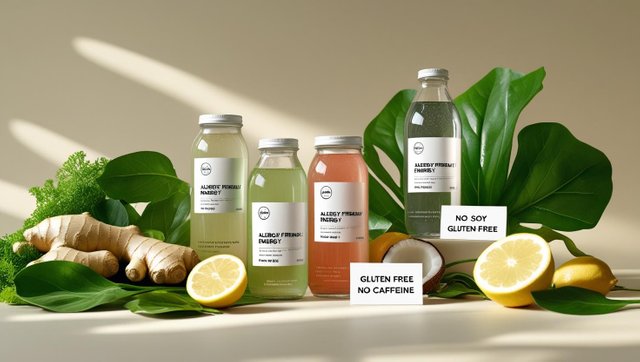Allergy-Friendly Energy Drinks: Clean Labels, Real Results
The energy drink market has exploded over the last two decades, but with it has come a growing concern over hidden allergens, synthetic additives, and overly stimulating ingredients. As awareness of food sensitivities continues to rise, a new demand has emerged: allergy-friendly energy drinks that are both effective and safe.
Consumers today are looking for beverages that fuel focus, stamina, and productivity without compromising dietary restrictions. Whether it’s gluten, dairy, soy, artificial sweeteners, or caffeine sensitivity, the search for clean-label energy options is no longer niche—it’s mainstream.
This article explores what makes an energy drink allergy-friendly, which ingredients to look for (and avoid), and how the newest generation of stimulant-free, plant-powered formulas are changing the way we think about energy.
Understanding the Need for Allergy-Friendly Energy Drinks
The rise in food allergies, intolerances, and sensitivities isn’t anecdotal. According to the CDC, food allergies among children increased by 50% between 1997 and 2011, and adult diagnoses have followed a similar trend. Even for those without full-blown allergies, certain ingredients can trigger inflammation, digestive upset, or cognitive fog.
Traditional energy drinks are often loaded with:
Artificial flavors and preservatives
Refined sugars or sugar alcohols (e.g., erythritol)
Dairy-based additives
Gluten-containing stabilizers
Caffeine and synthetic stimulants like yohimbine or guarana
For many, these components create more problems than they solve.
Key Attributes of Allergy-Friendly Energy Drinks
A truly allergy-conscious energy beverage prioritizes ingredient clarity and avoids common dietary triggers. Look for drinks that are:
Caffeine-free
Gluten-free
Dairy-free
Soy-free
Nut-free
Artificial additive-free
Non-GMO and organic when possible
Bonus points for recyclable packaging and third-party testing.
Functional Ingredients to Power Your Day
You don’t need synthetic caffeine to feel energized. Here are the most effective plant-based ingredients found in allergy-friendly energy drinks:
- Adaptogens
Herbs like rhodiola, ashwagandha, and schisandra help the body adapt to stress while promoting sustained energy. These are well tolerated by most people and free from major allergens.
- Nootropic Botanicals
Ingredients such as L-theanine, lion’s mane mushroom, and bacopa monnieri enhance mental clarity, focus, and alertness without overstimulation.
- Kava Root and Leaf Kratom
Used responsibly, these plant-based compounds promote calm focus and motivation. They serve as natural stimulant alternatives for those avoiding synthetic ingredients.
- Electrolyte Complexes
Magnesium, potassium, and trace minerals are vital for hydration and energy production. Look for sugar-free formulas without artificial sweeteners.
- Green Tea Extract (Caffeine-Free Variants)
Decaffeinated green tea offers antioxidant benefits and L-theanine, supporting balanced energy.
- B-Vitamins (Especially B12 and B6)
Crucial for energy metabolism, these are often derived from yeast or synthetic vegan sources.
What to Avoid: Common Hidden Triggers
Even drinks labeled as "natural" may contain problem ingredients. Avoid energy drinks with:
Proprietary blends (which mask specific ingredient amounts)
Artificial sweeteners (e.g., sucralose, aspartame)
Preservatives like sodium benzoate
Colorants (Red 40, Yellow 5)
Dairy proteins (whey, casein)
Gums and emulsifiers derived from soy or corn
Label Transparency: Why It Matters
A clean label isn't just about buzzwords—it’s about ingredient traceability and honest formulation. Trustworthy brands will:
Disclose exact ingredient dosages
Highlight allergen-free status
Provide sourcing information (e.g., organic, wild-harvested, non-GMO)
Conduct third-party testing
Look for certifications from NSF, USDA Organic, or Non-GMO Project for added assurance.
Top Use Cases for Allergy-Friendly Energy Drinks
Morning Productivity BoostInstead of caffeine, use drinks featuring L-theanine, rhodiola, or green tea polyphenols to improve clarity and momentum.
Afternoon Slump RecoveryTry electrolyte-infused tonics with kratom (where legal), kava root, or ginseng for a second wind without overstimulation.
Exercise Performance SupportLook for blends that contain coconut water, beetroot extract, and adaptogens to sustain energy and muscle endurance.
Mental Focus and Study SessionsDrinks with lion’s mane mushroom, bacopa, or B12 support cognitive function and recall.
Who Benefits Most From These Formulas?
People with multiple dietary restrictions
Those seeking natural stimulant alternatives
Individuals with autoimmune conditions or gut sensitivities
Wellness-conscious professionals and students
Athletes looking for clean pre-workout options
Trends to Watch in 2025
The allergy-friendly energy space is evolving. Innovations on the horizon include:
Personalized formulations based on food sensitivity testing
Fermented botanical tonics with probiotic synergy
AI-powered product matching for dietary profiles
Portable powder sachets for clean hydration on the go
Final Thoughts: Fuel Without the Fallout
Allergy-friendly energy drinks represent the next frontier in functional beverages—products designed to energize without compromise. As consumers grow more ingredient-savvy and demand transparency, the best formulas will rise to the top through clean sourcing, thoughtful formulation, and measurable results.
If you're sensitive to caffeine, gluten, dairy, or artificial ingredients, there's no need to settle. With the right label—and the right ingredients—you can find an energy drink that works in harmony with your body and your dietary needs.
In 2025 and beyond, energy should feel good, not forced.
